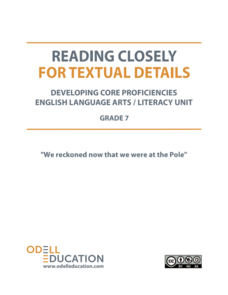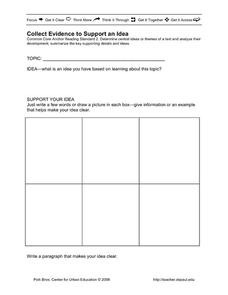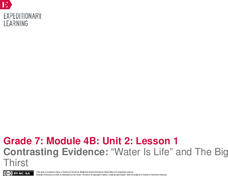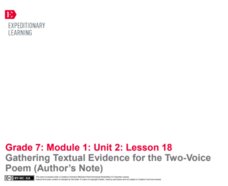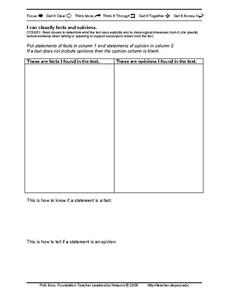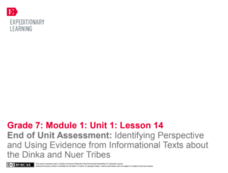Warren County Public Schools
Citing Textual Evidence
By using explicit textual evidence, individuals can strongly support their ideas and opinions. The presentation suggests in order to use explicit textual evidence, one must state their idea, cite evidence in the text that led to the...
Scholastic
Citing Text Evidence
Could you go without your cell phone for 48 hours? Pose this question to your class and then read the article provided here. Pupils mark the text and and complete a graphic organizer that requires the use of textual evidence.
Curated OER
Is That a Fact?
Investigate popular scientific claims and gather evidence to defend or argue against an author's stance. Writers synthesize information and compose their own "Really?" columns modeled after those found in the weekly "Science Times"...
Odell Education
Reading Closely for Textual Details: Grade 7
Enhance the reading experience with a set of lessons designed to improve textual analysis. Seventh graders use guiding questions to read both informational text and literature closely in the first part of the unit. Next, they work on...
Polk Bros Foundation
Collect Evidence to Support an Idea
In order to support an idea, writers must use evidence. Your class members can prepare their evidence with this basic instructional activity. Writers note down the topic they are learning about and their own idea. Next, they come up with...
Making Evidence-Based Claims: Grade 7
New ReviewThe most effective way to support an argument is with clear and relevant evidence. As seventh graders read and listen to Cesar Chavez's California Commonwealth Club Address, they work through five sections of a textual analysis unit,...
Polk Bros Foundation
I Can Identify a Nonfiction Writer's Main Idea and Supporting Examples
Use this page to quickly identify the central idea of a text and organize ideas for writing an informational or explanatory text. The worksheet is split into two parts. In the first part, pupils note down the main idea and supporting...
EngageNY
Contrasting Evidence: “Water Is Life” and The Big Thirst
Sometimes differing arguments support the same claim. Scholars complete a graphic organizer comparing how two authors support the claim that people need to better manage the world's water supply. Pupils also complete a graphic organizer...
Odell Education
Building Evidence-Based Arguments: “Doping can be that last 2 percent.”
Even the most thrilling sports career can end in an asterisk if the player uses performance-enhancing drugs. Focused on the topic of doping in sports, a seventh grade unit breaks down the arguments for and against steroids in five...
Polk Bros Foundation
Common Core Constructed Response Organizer
Get your writers ready to compose a constructed response essay in response to either an informational or fictional text. Pupils note down the big idea they wish to address as well as up to nine examples from the text that they wish to...
EngageNY
Gathering Textual Evidence for the Two-Voice Poem (Author’s Note)
Writers take a look at how to gather evidence from the information text in the unit that connects to Salva and Nya’s story. They complete a Gathering Evidence from Informational Texts sheet to guide their work. Pupils then use the...
EngageNY
Contrasting Authors’ Use of Evidence: Bottled Water
Apples to oranges, Dasani to Aquafina. Using a Venn diagram, scholars contrast two authors' use of evidence on the topic of bottled water. Additionally, they continue reading Charles Fishman's The Big Thirst and answering text-dependent...
K12 Reader
Traveling to the Distant West
If you build it they can come. After reading a short article about the impact of western expansion, middle schoolers cite evidence from the article to explain how this expansion forced changes in transportation.
Polk Bros Foundation
Read to Learn
Prepare for a research project or just use this worksheet on its own. Class members choose a topic, write a big question about it, and note down information they find about it. The final product is a longer written assignment in the...
Polk Bros Foundation
I Can Classify Facts and Opinions
Telling fact from opinion can be tricky. Direct your class to practice their reading and comprehension skills by taking notes on the facts and opinions in a text. Pupils fill out a two-column chart and write down how they know a...
K12 Reader
Earthquakes: Movement of the Earth's Crust
Readers use context to determine the meaning of words found in a short article about earthquakes and the movement of the earth's crust.
K12 Reader
What is a Tribal Government?
How are tribal governments similar to local or state governments? After reading a short article on tribal governments, individuals draw evidence from the provided article to respond to this reading comprehension question.
EngageNY
Analyzing Text Structure: “Teen Slang: What’s, Like, So Wrong with Like?”
What did you say? Class members read Teen Slang: What’s, Like, So Wrong with Like and make notes in the margin to determine the gist. They then analyze the text to identify claims made and the evidence to support the claims. After ...
Polk Bros Foundation
I Can Identify/Infer Motive
Why do people and characters act as they do? Require your class figure out the motivation of two people or characters they read about in a given text. In the short charts, pupils note down who, what they do, and why they do it. After...
Polk Bros Foundation
I Can Sequence Important Events
After reading any short informational or fictional text, ask your class to analyze the important events. They note down three important events on a short timeline, describing the events with either words or drawings. After this, pupils...
EngageNY
End of Unit Assessment: Identifying Perspective and Using Evidence from Informational Texts about the Dinka and Nuer Tribes
Pupils consider the varying perspectives of people in different cultural groups as they read an informational text about the Dinka tribe of Southern Sudan and complete graphic organizers. They also respond to a constructed-response...
Pearson
Making Inferences
The ability to make inferences is an important skill. Provide your class with some practice. This resource includes several different passages with which learners are required to practice inferring. They read each passage and respond to...
K12 Reader
Limited Resources
Here's a comprehension exercise that asks readers to include direct quotes in their analysis of an article on ways to conserve natural resources.
K12 Reader
What's the Forecast?
Rain gauges, thermometers, and wind vanes. After reading a short article about weather forecasting, readers identify the tools meteorologists use to predict the weather.





